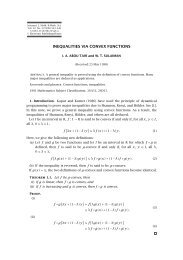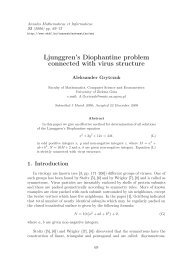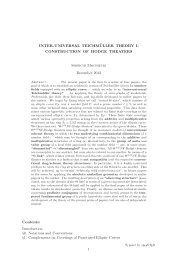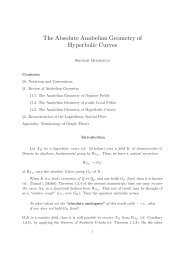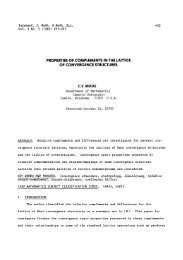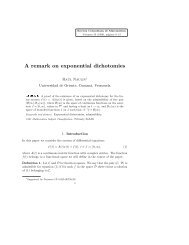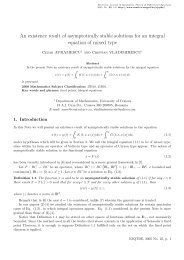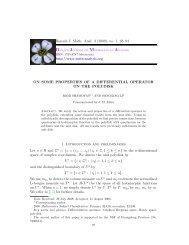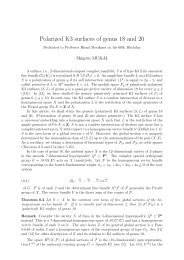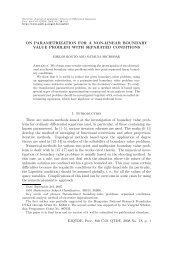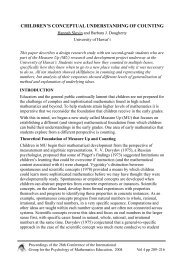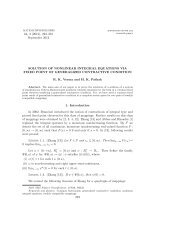Generalized permutative representation of Cuntz algebra. II ...
Generalized permutative representation of Cuntz algebra. II ...
Generalized permutative representation of Cuntz algebra. II ...
You also want an ePaper? Increase the reach of your titles
YUMPU automatically turns print PDFs into web optimized ePapers that Google loves.
4 Degeneracy <strong>of</strong> periodic cycle<br />
For a given w ∈ T S(C N ), we always have a <strong>representation</strong> GP (w) by Theorem<br />
2.3 (i). Although, the uniqueness <strong>of</strong> GP (w) does not always hold when<br />
w is periodic. In order to classify GP (w) for periodic w, we introduce a new<br />
parameter here.<br />
Denote<br />
Then<br />
T S P (C N ) ≡ {w ∈ T S(C N ) : w is periodic },<br />
T S NP (C N ) ≡ {w ∈ T S(C N ) : w is non periodic }.<br />
T S(C N ) = T S P (C N ) ⊔ T S NP (C N ), (4.1)<br />
T S P (C N ) = {w ⊗k : w ∈ T S(C N ), k ≥ 2}<br />
= {w ⊗k : w ∈ T S NP (C N ), k ≥ 2} (4.2)<br />
k<br />
where v ⊗k = v ⊗ · · · ⊗ v. Particularly, S(C<br />
} {{ }<br />
N ) ⊂ T S NP (C N ). The ambiguity<br />
<strong>of</strong> GP <strong>representation</strong> <strong>of</strong> periodic case occurs because the period number<br />
<strong>of</strong> parameter degenerates in the level <strong>of</strong> <strong>representation</strong> in general. We show<br />
this meaning in the following.<br />
Definition 4.1 Let (H, π, Ω) be GP (v ⊗p ) for v ∈ T S NP (C N ) and p ≥ 1.<br />
(i) A complex subspace W (H, π, Ω) ≡ Lin < {π(s(v)) l Ω ∈ H : l =<br />
0, . . . , p − 1} > is called the period subspace <strong>of</strong> H.<br />
(ii) (H, π, Ω) is degenerate if dim W (H, π, Ω) < p.<br />
(iii) dim W (H, π, Ω) is called the proper period <strong>of</strong> (H, π, Ω).<br />
Lemma 4.2 Under assumption and notation in Definition 4.1, the followings<br />
hold:<br />
(i) 1 ≤ dim W (H, π, Ω) ≤ p.<br />
(ii) π(s(v))| W (H,π,Ω) is a unitary from W (H, π, Ω) to W (H, π, Ω).<br />
(iii) π(s(v)) p | W (H,π,Ω) is the identity operator on W (H, π, Ω).<br />
6



